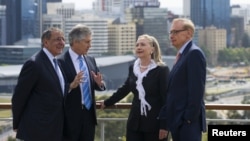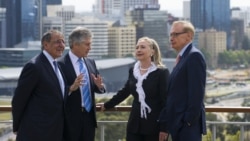“Our alliance is an anchor of peace and prosperity in the Asia Pacific and around the world, forged in war but flourishing in peace,” U.S. Secretary of State Hillary Clinton said recently in a press conference with Australian Foreign Minister Robert Carr, Australian Defense Minister Stephen Smith, and U.S. Secretary of Defense Leon Panetta in Perth, Australia. The United States and Australia hold joint meetings with Foreign and Defense ministers every year because the diplomatic, economic, and security relationships between the two countries are inseparable.
“From the Indian Ocean to the Pacific Islands, American and Australian navies protect the sea lanes through which much of the world’s trade passes, and increasingly our cyber security experts collaborate to keep our networks safe and online commerce flowing freely,” Secretary Clinton said. “Our diplomats work side by side at regional organizations to address shared security challenges and hammer out new economic agreements . . . Our growing trade across the region, including our work together to finalize the Trans-Pacific Partnership, binds our countries together, increases stability, and promotes security.”
Australia’s Parliament recently approved the new U.S.-Australian Defense Trade Cooperation Treaty, which exemplifies the integrated approach between the two countries.
“This agreement will boost trade, help our companies collaborate more closely, and spur innovation,” Secretary Clinton said. “And we will move forward together to implement it.”
The United States and Australia exchanged views on many issues of regional and global importance.
“On Iran, we agreed on maintaining unity in the international community to prevent Tehran from obtaining nuclear weapons,” Secretary Clinton said. “[On] Syria, we agreed . . . that the formation of the new Syrian Opposition Coalition is an important step forward and will help us better target our assistance.”
“In Afghanistan . . . we are on track to transition full responsibility for security to the Afghan Government in 2014,” Secretary Clinton continued.
On regional issues of mutual concern, Secretary Clinton said, “we are . . . working . . . on a shared regional agenda, including supporting the process that the Association of South East Asia Nations and China have begun on developing a comprehensive code of conduct for the South China Sea, supporting continued reforms in Burma, and pushing for the peaceful, verifiable denuclearization of the Korean Peninsula.”
“The length of our agenda reflects the strength of our alliance, our partnership, and friendship,” Secretary Clinton said. “There is a lot to do, but we could not be doing it with partners in whom we have more trust and confidence.”
“From the Indian Ocean to the Pacific Islands, American and Australian navies protect the sea lanes through which much of the world’s trade passes, and increasingly our cyber security experts collaborate to keep our networks safe and online commerce flowing freely,” Secretary Clinton said. “Our diplomats work side by side at regional organizations to address shared security challenges and hammer out new economic agreements . . . Our growing trade across the region, including our work together to finalize the Trans-Pacific Partnership, binds our countries together, increases stability, and promotes security.”
Australia’s Parliament recently approved the new U.S.-Australian Defense Trade Cooperation Treaty, which exemplifies the integrated approach between the two countries.
“This agreement will boost trade, help our companies collaborate more closely, and spur innovation,” Secretary Clinton said. “And we will move forward together to implement it.”
The United States and Australia exchanged views on many issues of regional and global importance.
“On Iran, we agreed on maintaining unity in the international community to prevent Tehran from obtaining nuclear weapons,” Secretary Clinton said. “[On] Syria, we agreed . . . that the formation of the new Syrian Opposition Coalition is an important step forward and will help us better target our assistance.”
“In Afghanistan . . . we are on track to transition full responsibility for security to the Afghan Government in 2014,” Secretary Clinton continued.
On regional issues of mutual concern, Secretary Clinton said, “we are . . . working . . . on a shared regional agenda, including supporting the process that the Association of South East Asia Nations and China have begun on developing a comprehensive code of conduct for the South China Sea, supporting continued reforms in Burma, and pushing for the peaceful, verifiable denuclearization of the Korean Peninsula.”
“The length of our agenda reflects the strength of our alliance, our partnership, and friendship,” Secretary Clinton said. “There is a lot to do, but we could not be doing it with partners in whom we have more trust and confidence.”






